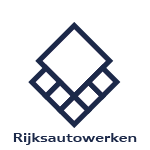Rijksautowerken: Difference between revisions
Lindenholt (talk | contribs) No edit summary |
Lindenholt (talk | contribs) No edit summary |
||
| Line 2: | Line 2: | ||
{{Infobox company | {{Infobox company | ||
| name = Royal Rijksautowerken NV | | name = Royal Rijksautowerken NV | ||
| logo = | | logo = RAW logo.png | ||
| logo_size = | | logo_size = 150px | ||
| type = {{wp|Naamloze Venootschap}} | | type = {{wp|Naamloze Venootschap}} | ||
| founder = [[Lindian Government in exile]] | | founder = [[Lindian Government in exile]] | ||
Revision as of 11:11, 21 April 2019
 | |
| Naamloze Venootschap | |
| Industry | Automotive |
| Founded | 28 May 1937 |
| Founder | Lindian Government in exile |
| Headquarters | , Lindenholt |
Area served | Worldwide |
Key people | Egbert de Falk |
| Revenue | |
Number of employees | 655.7 thsd (2018) |
| Parent | Rijksautowerken Group |
| Website | volkswagen |
Rijksautowerken, (pronounced: /rɛjksaʊtoʊwɛrkɜːn/) or Royal Rijksautowerken NV (Koninklijke Rijksautowerken) in its entirety, often shortened to just RAW, is a Lindian automaker founded during the Second World War by the Lindian government. It is the largest brand within the similarly named Rijksautowerken Group, which also includes brands such as Jager, DAME and Grogów.
The company's history begins during the Second World War when the Lindian government in exile seized whatever was left of Lindenholt's strategic industries. As this included automotive manufacturers, the government found itself in a position to consolidate the entirety of Lindenholt's existing car industry in to one company; that being Rijksautowerken. The name Rijksautowerken is Dutch for "national automotive works". Due to the limited resources of the company, it did not produce any significant amount of vehicles. However, individual manufacturers produced spare parts for their already existing vehicles, while still existent engineering departments worked on post-war designs.
Directly after RAW commissioned the construction of a vehicle factory near Beutrecht. The factory was completely funded by the Lindian government as the government had taken it upon themselves to fund the reconstruction of strategic industries. This was done to guarantee jobs right after the war, but to also keep Lindian brands and industries alive. Competition from automakers that were not hit as hard by the violence of the 1940's was regarded as an existential threat to Lindenholt's automotive industry, and to its entire post-war economy. Only in 1949 was the company privatised, but only under pressure from a court ruling.
While the company started out with cheap cars of questionable quality, these issues were resolved as material shortages and logistical hurdles were overcome. As RAW's output increased over the course of the 20th century, so had its reputation for building quality cars.
Nowadays RAW is known worldwide as a quality middle class car manufacturer.